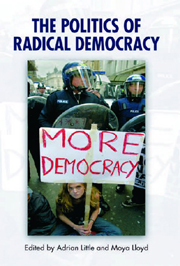Book contents
- Frontmatter
- Contents
- Acknowledgements
- Notes on the Contributors
- Introduction
- 1 Rhetoric and Radical Democratic Political Theory
- 2 Performing Radical Democracy
- 3 Aboriginal Sovereignty and the Democratic Paradox
- 4 Judith Butler, Radical Democracy and Micro-politics
- 5 Post-structuralism, Civil Society and Radical Democracy
- 6 Hegemony and Globalist Strategy
- 7 Is ‘Another World’ Possible? Laclau, Mouffe and Social Movements
- 8 Friends and Enemies, Slaves and Masters: Fanaticism, Wendell Phillips and the Limits of Agonism
- 9 The Northern Ireland Paradox
- Conclusion
- Bibliography
- Index
8 - Friends and Enemies, Slaves and Masters: Fanaticism, Wendell Phillips and the Limits of Agonism
Published online by Cambridge University Press: 12 September 2012
- Frontmatter
- Contents
- Acknowledgements
- Notes on the Contributors
- Introduction
- 1 Rhetoric and Radical Democratic Political Theory
- 2 Performing Radical Democracy
- 3 Aboriginal Sovereignty and the Democratic Paradox
- 4 Judith Butler, Radical Democracy and Micro-politics
- 5 Post-structuralism, Civil Society and Radical Democracy
- 6 Hegemony and Globalist Strategy
- 7 Is ‘Another World’ Possible? Laclau, Mouffe and Social Movements
- 8 Friends and Enemies, Slaves and Masters: Fanaticism, Wendell Phillips and the Limits of Agonism
- 9 The Northern Ireland Paradox
- Conclusion
- Bibliography
- Index
Summary
Fanaticism presents one of the most important political problems since 11 September 2001. Curiously, however, this subject has so far largely evaded scrutiny by political theorists. The rise in extremist activity since the end of the Cold War is often noted and decried, but contemporary democratic theorists have yet to analyse extremism as a political category. This is true even of the branch of theory usually referred to as ‘agonistic democratic theory’, which maintains that conflict is a permanent, central and potentially useful feature of democratic politics. Current debates between deliberative and agonistic models of democracy concern whether public deliberation is irreducibly agonistic or whether it should strive conceptually for consensus. Yet this debate obscures what these two branches of democratic theory share. Despite an appreciation for the role of conflict in politics, agonistic democratic theory's approach to political conflict is quite similar to its purportedly conflict-averse rival. That is, like deliberative models, agonistic theories overwhelmingly focus on conflict that takes place among parties who share a common liberal ethical and political framework that provides the principles and rules within which legitimate political contest takes place. Contemporary democratic theory does not much analyse challenges to this framework. To the extent that it does, it overwhelmingly understands them as a threat to democracy. Democratic theory lacks an account of fanaticism, then, because it tends to focus on conflicts between parties who share a liberal framework and largely ignores conflicts over the framework itself – which is precisely the terrain that tends to breed zealots. As a result, democratic theory has yet to grapple with one of the key political problems of the twenty-first century.
- Type
- Chapter
- Information
- The Politics of Radical Democracy , pp. 158 - 178Publisher: Edinburgh University PressPrint publication year: 2008



